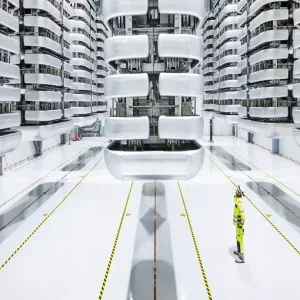To kick off their collaboration, with a duration of five years, both companies this month have begun performing pilot tests in the waste water treatment plant located in Jerez. As part of their collaboration, SEAT has provided Aqualia with two SEAT Leon TGI vehicles to conduct the necessary testing with the biomethane obtained from the waste water to confirm and verify the entire production chain until the fuel is obtained and used.
This joint project constitutes a step forward in the development of a circular economy and the construction of resilient cities. In addition, it will help drive research and the creation of alternative fuels in the Spanish automotive sector by producing renewable, 100% local gas, whose main advantage is that the full use of biomethane-powered cars will enable CO2 emissions to be reduced “Well to Wheel” compared with vehicles powered by petrol.
SEAT is fully behind this collaboration, as it is a firm commitment to a genuine ecological alternative to petroleum products, and thus aligning with the company’s Compressed Natural Gas strategy (CNG) and its commitment to improving the environment. According to SEAT Vice-President for R&D Dr. Matthias Rabe, “with this development and collaboration project with Aqualia, SEAT has become the first brand in the country’s automotive sector to use 100% Spanish biomethane obtained from waste water”. “Fostering the creation of renewable alternative fuels, which help promote future environmental improvements and the long-term use of vehicles in cities are an integral part of SEAT’s CNG strategy”, added Dr. Rabe.
Aqualia general director Félix Parra pointed out that “we are working to change the current paradigm, leaving behind the model in which treatment implies a significant energy cost. This project is the result of the intense research activity developed by Aqualia to obtain valuable resources from the treatment process. Developing the Smart Green Gas project with a medium sized waste water treatment plant could potentially lead to the daily production of a million litres of biofuel, enough to power more than 300 vehicles. This would enable cities to fuel their network of urban buses, bin lorries, police cars or ambulances, among others”.
SMART Green Gas aims to optimise and make the energy System more flexible and achieve greater energy security in the EU, by providing more autonomy and sustainability to cities which implement this system in their waste water treatment plants. This is achieved through the development of new, highly efficient systems for producing biogas and converting it into biomethane, which are generated from sewage in cities’ waste water treatment plants. SMART Green Gas aims to obtain locally produced, renewable fuel that can be used in the automotive sector or injected into the natural gas distribution network.
Supported by the Centre for Industrial Technological Development (CDTI), SMART Green Gas is being developed with the participation of five partners, including Gas Natural Fenosa and Naturgas EDP, as well as public research organisations such as the Catalan Institute for Water Research (ICRA) and the universities of Girona, Valladolid and Santiago de Compostela. SEAT is participating in conjunction with Aqualia.






